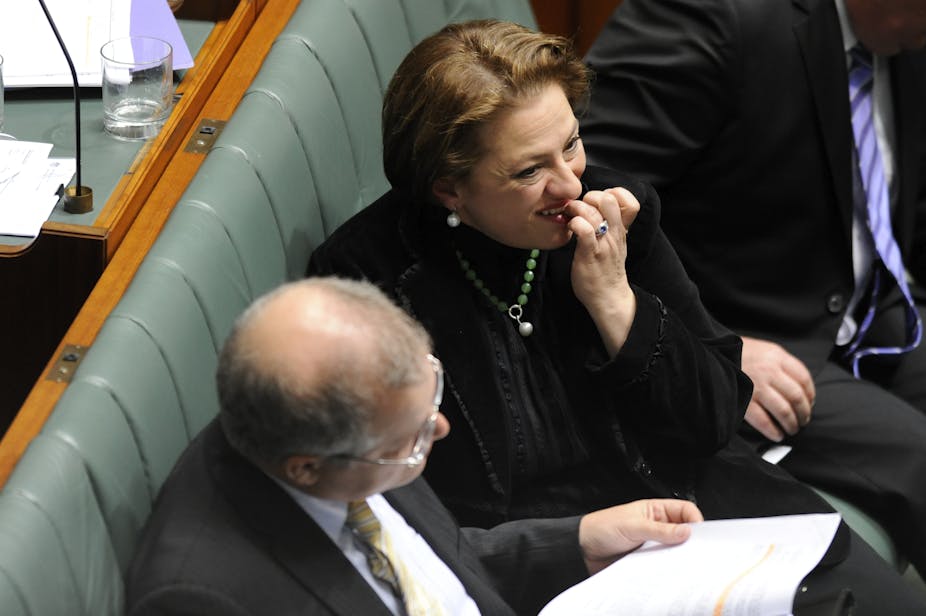The federal Victorian seat of Indi covers a major part of Victoria’s northeast. The Hume Highway and the Melbourne-to-Sydney railway run through the electorate’s demographic centre and at various points intersect the major population centres of Benalla, Wangaratta and Wodonga, just south of Albury and the NSW border.
The sprawling electorate predominantly relies on agriculture, but its economy is supplemented by tourism from the nearby Hume and Dartmouth dams Lake Eildon and the northeast alpine region, administrative services and education.
The median family income of the seat is A$936 per week, well below the state-wide median of $1216 per week. Within its nearly 98,000 enrolled voters, 20- to 30-year-olds are under-represented, while the 86% who are Australian-born is well above the state-wide figure of 69%.
Indi is a rural seat typical of those found among the Liberal Party’s safer divisions. It is currently on a two-party preferred margin of close to 10%, although the seat was held by the National (formerly Country) Party from 1958 to 1977.
In 1977, Liberal candidate E.C. Cameron won the seat in a “three-cornered” contest (between the Liberals, the ALP and the then-Country Party), and Indi has been in Liberal hands ever since. The Liberal Party’s grip can only be partially attributed to the Coalition agreement. When Cameron retired in 1993, his Liberal successor Lou Lieberman and subsequently the current sitting member, Sophie Mirabella (née Panopoulos), had to battle with Labor and the National Party as well as other minor parties and independents to win it.
When she won the seat in 2001, Mirabella secured 40.1% of the primary vote to the Nationals’ 12.3%. It is interesting to note that while Liberal candidates outpoll their National rivals in Indi on those occasions when a National candidate can run under the terms of the Coalition agreement, National candidates tend to outdo their Liberal counterparts in the concomitant state districts of Murray Valley and Benalla (but not Benambra in the far northeast, which remains a Liberal stronghold).
Indi is not a marginal seat, the potential for the Liberal and National parties to have a go at each other notwithstanding. As a sitting member and a shadow minister in a party that appears to be on its way back to government, one could expect Mirabella to win with an increased majority. Even so, an element of doubt has crept into the contest with the nomination of an independent candidate, Cathy McGowan.
McGowan is a former Liberal Party member - she worked for E.C. Cameron - with a strong local profile. She has gained the attention of the local media not least because of the enthusiasm with which some of her campaign events in the major population centres have been met.
The viability of McGowan’s candidacy appears to have been enhanced by two other important developments: first, the Labor Party, which tends to poll around 27% in this seat, is indicating that it will direct preferences to McGowan. There are also rumours that local Nationals, aggrieved at the Liberal Party’s decision to run a candidate against the Nationals’ high-profile candidate Andrew Broad in Mallee, are aligning themselves with McGowan.
The theory goes that the support of National voters in the seat combined with the shift of Labor and Liberal voters could push McGowan ahead of Labor in the count and allow her to overtake Mirabella with Labor preferences. Support for Mirabella measured in a recent ReachTEL poll had the Liberal vote at 43%, McGowan on 23% and Labor candidate Robyn Walsh on 17%. On these figures, the outcome would be close and McGowan would be in with a chance of pinching the seat.

While strong independent campaigns in rural districts are not unknown in Australian politics, McGowan’s momentum is a little surprising given the poor press received by rural independents in the advent of the minority Labor government that depended on Tony Windsor and Rob Oakeshott for its survival. One might have thought the time was hardly opportune for another aspiring rural independent seeking to win support from traditionally strong Liberal voters if the last time rural independents held the balance of power it resulted in a Labor government.
Other manifestations of rural unrest - such as the rise of One Nation in 1998 - coincided with a period of Coalition government and a strong sense of rural dissatisfaction with the Howard government’s policy approach. McGowan’s campaign rhetoric is full of reference to notions of rural disadvantage but it is Labor, not the Liberal Party, that has been the party of government. Therefore Mirabella, as a shadow minister, has not been in charge of any policies that might affect her constituents directly.
With the exception of the role being played by strains in the Liberal-National coalition arrangement in Victorian state politics, the only other explanation for the momentum behind McGowan’s candidature is that it is primarily a personal campaign against Mirabella. This is presumably due to more than dissatisfaction with her role as the shadow industry minister or her contributions to national policy debate.
This contest will give an insight into the extent to which personality politics can displace party identity as a driver of voter choice. Mirabella is the sitting Liberal member in a strong Liberal-voting seat. There can be no National candidate as a result of the federal Coalition agreement, and the national polls are showing that voters are aligning themselves to the Coalition to vote the Labor party out of government. Given all of this, Mirabella ought to win Indi and win it very comfortably.
If, however, McGowan were to win Indi, this conventional approach to electoral behaviour would have to be re-thought. As a result, more weight would have to be attached to the politics of personality conflict as an influence in electoral contests, for this is what the campaign for Indi has become.

